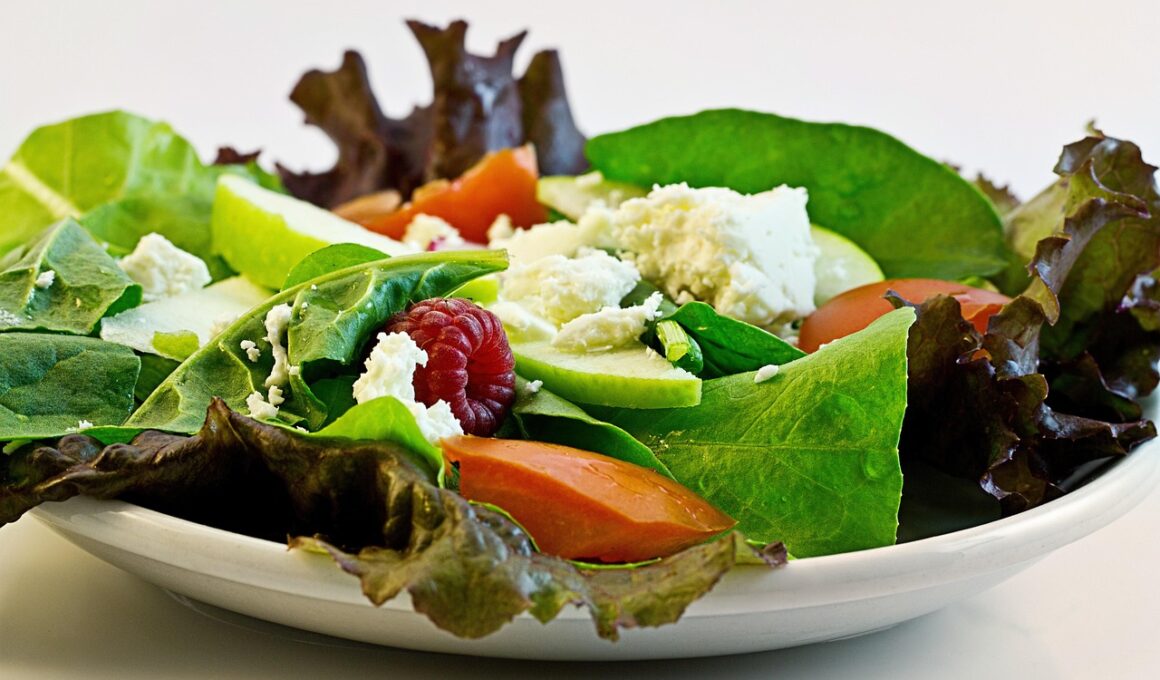Budget-Friendly Meal Planning for Weight Loss
When embarking on a weight loss journey, meal planning is an essential step. Budget-friendly meal planning allows individuals to control portions, select nutritious ingredients, and save money. Understanding how to plan meals efficiently can make a significant difference in achieving weight loss goals. Begin by thinking about your weekly schedule and identifying dedicated times to prepare healthy meals. Include a variety of food groups in your plan to ensure you’re receiving balanced nutrition while being mindful of your budget. This approach reduces impulse buys and minimizes waste by allowing you to use all ingredients purchased. Incorporate fruits, vegetables, whole grains, lean proteins, and healthy fats into your diet for a wholesome meal plan. Utilizing a grocery list when shopping can further help manage spending and limit unnecessary expenses. Keep in mind that cooking in batches can also assist with budget management since it allows you to prepare multiple meals from affordable ingredients, making it easier to adhere to your plan. The right strategies will also contribute significantly to establishing healthy habits that lead to sustainable weight loss over time.
Another valuable strategy for budget-friendly meal planning involves seasonal shopping and utilizing sales. Shopping seasonally means purchasing fruits and vegetables that are currently in abundance, which often lowers their price. Additionally, taking advantage of weekly store sales or discounts on perishable items can lead to substantial savings. You can even consider joining a wholesale club or local community-supported agriculture (CSA) group to get fresh produce at lower rates. Another tip is to incorporate leftover ingredients creatively into new meals to prevent waste. For instance, if you roast vegetables for one meal, consider using the leftovers in salads, wraps, or omelets the next day. This versatility ensures that each dollar spent translates into multiple meals and reduces the chance of discarding old produce. Not only does it save money, but it also encourages innovation in the kitchen while adhering to nutritional goals. Planning meals around sales can extend to staple items like grains or legumes, which can be bought in bulk at lower prices. This method aligns well with a weight loss plan by ensuring that nutritious options are always available.
Creating a Weekly Meal Plan
Creating a detailed weekly meal plan is crucial in managing your budget effectively while keeping weight loss goals in sight. Designate specific meal categories such as breakfast, lunch, dinner, and snacks. After this, fill in each category with ideas that fit your dietary requirements and are budget-friendly. Consider using a template or an app to streamline the process visually. When selecting recipes, focus on those that share similar ingredients, enabling you to purchase in bulk and use them across several dishes, thus minimizing waste. Try selecting one protein source for your week, like chicken or beans, that can be prepared in various ways. Focus on versatility—using spices and cooking techniques can transform a single ingredient into multiple meals. Moreover, reflect on your caloric needs and balance them with your activity level to ensure you remain within your desired intake for weight loss. Each meal should incorporate protein and fiber to sustain satiety throughout the day. Investing some time in meal planning leads to more mindful eating practices, aids weight management, and supports achieving your health goals.
In addition to planning, consider how you store prepped meals and ingredients to maintain freshness. Proper storage can prevent spoilage and save money in the long run. Use airtight containers, and label them with dates to monitor freshness easily. Understanding appropriate portion sizes can also help you maintain a caloric deficit for weight loss. Storing meals in single-serving containers makes it easier to control portions and grab healthy alternatives versus fast food options when pressed for time. Don’t forget to create a separate space in your freezer for prepared meals. When unexpected hunger strikes, having healthy, budget-friendly options ready at hand is invaluable. Additionally, involve family members in meal prep to encourage communal eating habits and share the workload. This inclusion not only allows everyone to contribute but also helps in educating loved ones about nutrition. Cooking together can strengthen family bonds and create a fun atmosphere around healthy eating. By making meal prep a family activity, it can become a more sustainable practice over time, encouraging accountability and support in each person’s weight loss journey.
Healthy Snack Planning
Snacks play a key role in meal planning, especially in a budget-friendly framework. Healthy snacks curb hunger between meals and can prevent unhealthy choices. Preparing healthy snacks in advance also aligns well with cost-effective strategies. Consider options like pre-portioning nuts, making veggie sticks, or baking whole-grain snacks. Having these choices readily available minimizes temptations to reach for processed snacks that may be more expensive and less nutritious. Moreover, try experimenting with various ingredients and flavors to keep snacks interesting. A mini fruit salad or yogurt parfait layered with homemade granola can provide both enjoyment and satisfaction. When planning snacks, take into account the nutritional value alongside the cost. Prioritize whole, minimally processed foods which often deliver more nutritional benefits for their price. Investigate which snacks can be made in larger batches without excessive cost and enjoy them over a week or two. This level of preparation pays off in aiding your weight loss journey, helping you stay nourished without overspending. Balanced snacks contribute to maintaining consistent energy levels during the day, supporting overall wellbeing.
As you embark on your budget-friendly meal planning, it’s essential to remain adaptable and willing to try new recipes and substitutes. Exploring different cuisines can help introduce new ingredients without straining your finances. Another way to save money while diversifying meals is to focus on plant-based options. Beans, lentils, and grains are not only inexpensive but also packed with nutrients. They serve as ideal substitutes for more expensive meat options and can easily be incorporated into a variety of dishes. Consider setting a small budget for experimenting with one new recipe each week. This fosters creativity in the kitchen while allowing you to remain within budget constraints. Also, document what works best for you when discovering clever substitutes or meal combos. Consistency in experimenting helps you find healthy meals that you genuinely enjoy, making it easier to adhere to your budget-friendly meal plan. Meal prepping and planning responsibly put you on a positive path toward weight loss. By employing these strategies over time, you will develop not just a healthier diet but a more mindful approach to your overall spending and lifestyle.
Wrapping Up
In conclusion, budget-friendly meal planning for weight loss encompasses more than just saving money; it involves creating sustainable practices. The process requires discipline and creativity but reaps substantial rewards—weight loss, financial savings, and improved health. As you implement these strategies, stay committed to emphasizing whole foods and maintaining balanced nutrition. With the right approach, outcomes can include a revitalized relationship with food, learning to enjoy cooking at home, and a greater appreciation for your meals. Allow your budget to inspire rather than restrict you. This new mentality can lead to richer experiences in the kitchen, reduced stress regarding finances, and more satisfaction with your meals. Be prepared for some trial and error initially as you find the balance between budget and nutritional needs, but remain patient with yourself as you navigate this journey. Over time, you’ll discover a meal planning strategy that accommodates your preferences and supports your weight loss goals. Keep remembering your end goal, and reward yourself for progress, not just results. Embrace meal planning as an opportunity to foster healthy habits that contribute to a happier lifestyle.


